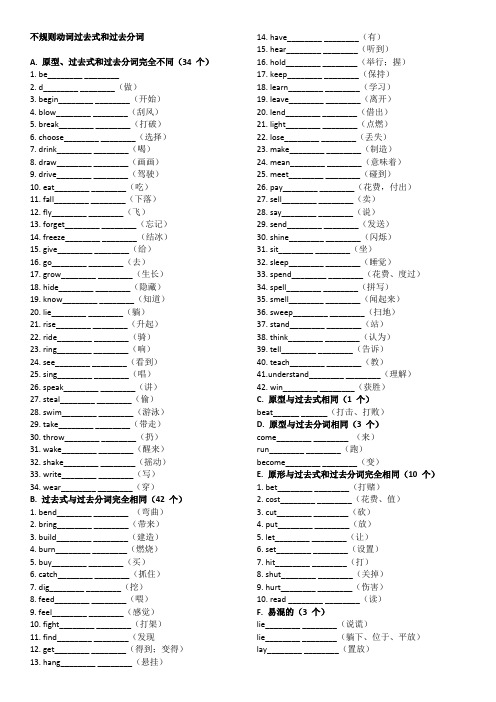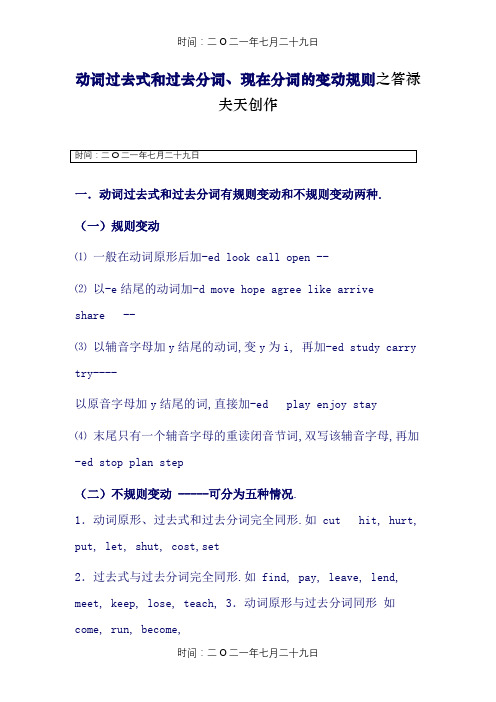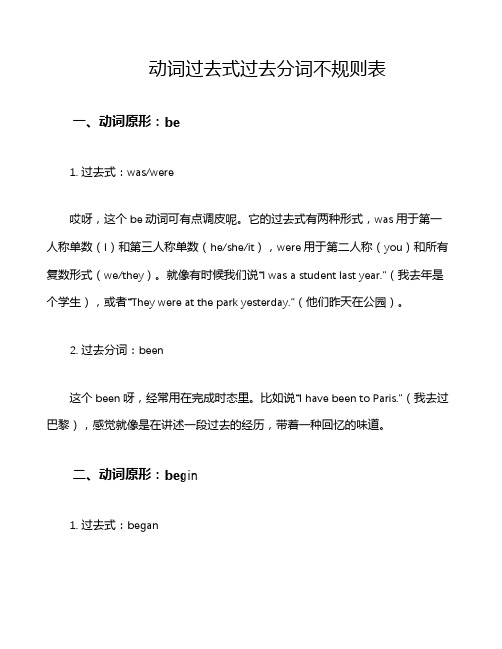不规则动词过去式和过去分词及其练习
过去式、过去分词、现在分词变化 规则及练习

动词过去式和过去分词、现在分词的变化规则一.动词过去式和过去分词有规则变化和不规则变化两种。
(一)规则变化⑴一般在动词原形后加-ed look call open -—⑵以-e结尾的动词加-d move hope agree like arrive share --⑶以辅音字母加y结尾的动词,变y为i,再加-ed study carry try———-以原音字母加y结尾的词,直接加-ed play enjoy stay⑷末尾只有一个辅音字母的重读闭音节词,双写该辅音字母,再加-ed stop plan step(二)不规则变化-———-可分为五种情况。
1.动词原形、过去式和过去分词完全同形。
如cut hit,hurt, put,let,shut, cost,set2.过去式与过去分词完全同形.如find,pay,leave,lend,meet,keep,lose,teach,3.动词原形与过去分词同形如come,run,become,4.动词原形、过去式、过去分词形式完全不同.如give,fly,drink,see,5.过去式和过去分词有两种形式burn,burned burnt burned burnt learn learned learnt learned learntSmell smelled smelt smelled smeltlie有规则变化和不规则变化两种,lie lied, lied(说谎) lie lay, lain (躺,位于)hang 有规则变化和不规则变化两种hang hanged, hanged(处绞刑) hang hung, hung(挂,吊)二、过去式和过去分词及发音1. ed在清辅音音素后发音为〔t〕,2. 在浊辅音后发音为〔d〕,在元音后发音也为[d]3。
—ed在〔t]、〔d〕后发音为[id]三、现在分词的变化规则1 一般在动词原形词尾加-ing,play carry go playing carrying going 2.以不发音的e结尾的动词,先去掉e,再加-ing take write leave taking writing leaving3.重读闭音节结尾的动词,如果词尾只有一个辅音字母,要将该末尾只有一个辅音字母的重读闭音节词,双写该辅音字母,再加-ing stop fit begin forget cutting stopping fitting beginning forgetting4.以ie结尾的动词,要把ie改为y,再加—ing lie die tie lying[dying tying练习:写出下列动词的过去式和现在分词push move cross spend finish rain travel arrive cut putshut go have come hurt mind visit notice pay playtry smile turn share listen count hear cry carry stop copy meet move study staytake make stand bring buyfight light think hold sittell cut set hit meetbe kick look do eatlike knock open see pullshow wash try give havehurry wake count post play。
不规则动词过去式和过去分词练习

不规则动词过去式和过去分词A. 原型、过去式和过去分词完全不同(34 个)1. be________ ________2. d________ ________(做)3. begin________ ________(开始)4. blow________ ________(刮风)5. break________ ________(打破)6. choose________ ________(选择)7. drink________ ________(喝)8. draw________ ________(画画)9. drive________ ________(驾驶)10. eat________ ________(吃)11. fall________ ________(下落)12. fly________ ________(飞)13. forget________ ________(忘记)14. freeze________ ________(结冰)15. give________ ________(给)16. go________ ________(去)17. grow________ ________(生长)18. hide________ ________(隐藏)19. know________ ________(知道)20. lie________ ________(躺)21. rise________ ________(升起)22. ride________ ________(骑)23. ring________ ________(响)24. see________ ________(看到)25. sing________ ________(唱)26. speak________ ________(讲)27. steal________ ________(偷)28. swim________ ________(游泳)29. take________ ________(带走)30. throw________ ________(扔)31. wake________ ________(醒来)32. shake________ ________(摇动)33. write________ ________(写)34. wear________ ________(穿)B. 过去式与过去分词完全相同(42 个)1. bend________ ________ (弯曲)2. bring________ ________(带来)3. build________ ________(建造)4. burn________ ________(燃烧)5. buy________ ________(买)6. catch________ ________(抓住)7. dig________ ________(挖)8. feed________ ________(喂)9. feel________ ________(感觉)10. fight________ ________(打架)11. find________ ________(发现12. get________ ________(得到;变得)13. hang________ ________(悬挂)14. have________ ________(有)15. hear________ ________(听到)16. hold________ ________(举行;握)17. keep________ ________(保持)18. learn________ ________(学习)19. leave________ ________(离开)20. lend________ ________(借出)21. light________ ________(点燃)22. lose________ ________(丢失)23. make________ ________(制造)24. mean________ ________(意味着)25. meet________ ________(碰到)26. pay________ ________(花费,付出)27. sell________ ________(卖)28. say________ ________(说)29. send________ ________(发送)30. shine________ ________(闪烁)31. sit________ ________(坐)32. sleep________ ________(睡觉)33. spend________ ________(花费、度过)34. spell________ ________(拼写)35. smell________ ________(闻起来)36. sweep________ ________(扫地)37. stand________ ________(站)38. think________ ________(认为)39. tell________ ________(告诉)40. teach________ ________(教)41.understand________ ________(理解)42. win________ ________(获胜)C. 原型与过去式相同(1 个)beat______ ______(打击、打败)D. 原型与过去分词相同(3 个)come________ ________ (来)run________ ________(跑)become________ ________(变)E. 原形与过去式和过去分词完全相同(10 个)1. bet________ ________(打赌)2. cost________ ________(花费、值)3. cut________ ________(砍)4. put________ ________(放)5. let________ ________(让)6. set________ ________(设置)7. hit________ ________(打)8. shut________ ________(关掉)9. hurt________ ________(伤害)10. read ________ ________(读)F. 易混的(3 个)lie________ ________(说谎)lie________ ________(躺下、位于、平放)lay________ ________(置放)。
过去式、过去分词、现在分词变化 规则及练习

动词过去式和过去分词、现在分词的变动规则之答禄夫天创作一.动词过去式和过去分词有规则变动和不规则变动两种. (一)规则变动⑴一般在动词原形后加-ed look call open --⑵以-e结尾的动词加-d move hope agree like arriveshare --⑶以辅音字母加y结尾的动词,变y为i, 再加-ed study carry try----以原音字母加y结尾的词,直接加-ed play enjoy stay⑷末尾只有一个辅音字母的重读闭音节词,双写该辅音字母,再加-ed stop plan step(二)不规则变动 -----可分为五种情况.1.动词原形、过去式和过去分词完全同形.如 cut hit, hurt, put, let, shut, cost,set2.过去式与过去分词完全同形.如 find, pay, leave, lend, meet, keep, lose, teach, 3.动词原形与过去分词同形如come, run, become,4.动词原形、过去式、过去分词形式完全分歧.如give,fly,drink, see,5.过去式和过去分词有两种形式burn, burned burnt burned burnt learn learned learnt learned learntSmell smelled smelt smelled smeltlie有规则变动和不规则变动两种,lie lied, lied(说谎)lie lay, lain(躺,位于)hang 有规则变动和不规则变动两种 hang hanged, hanged(处绞刑)hang hung, hung(挂,吊)二、过去式和过去分词及发音1. ed在清辅音音素后发音为〔t〕,2. 在浊辅音后发音为〔d〕,在元音后发音也为[d]3. -ed在〔t]、〔d〕后发音为[id]三、现在分词的变动规则1 一般在动词原形词尾加-ing, play carry go playing carrying going2.以不发音的e结尾的动词,先去失落e,再加-ing take write leave taking writing leaving3.重读闭音节结尾的动词,如果词尾只有一个辅音字母,要将该末尾只有一个辅音字母的重读闭音节词,双写该辅音字母,再加-ing stop fit begin forget cutting stopping fitting beginning forgetting4.以ie结尾的动词,要把ie改为y,再加-ing lie die tie lying[dying tying练习:写出下列动词的过去式和现在分词push movecross spendfinishrain travelarrive cutputshut gohave comehurtmind visitnotice payplaytry smileturn sharelistencount hearcry carrystopcopy meetmove studystaytake makestand bringbuyfight lightthink holdsittell cutset hitmeetbe kicklook doeatlike knock open seepullshow washtry givehavehurry wakecount postplay。
初中英语不规则动词过去式、过去分分类练习表(K12教育文档)

初中英语不规则动词过去式、过去分分类练习表(word版可编辑修改) 编辑整理:尊敬的读者朋友们:这里是精品文档编辑中心,本文档内容是由我和我的同事精心编辑整理后发布的,发布之前我们对文中内容进行仔细校对,但是难免会有疏漏的地方,但是任然希望(初中英语不规则动词过去式、过去分分类练习表(word版可编辑修改))的内容能够给您的工作和学习带来便利。
同时也真诚的希望收到您的建议和反馈,这将是我们进步的源泉,前进的动力。
本文可编辑可修改,如果觉得对您有帮助请收藏以便随时查阅,最后祝您生活愉快业绩进步,以下为初中英语不规则动词过去式、过去分分类练习表(word版可编辑修改)的全部内容。
初中英语不规则动词过去式、过去分词分类练习表一、 AAA型(动词原形、过去式、过去分词同形)1。
cost(花费) 2。
cut(割)3。
hit(打) 4。
hurt 伤害)5。
let(让) 6。
put(放)7。
read (读)二、 AAB型(动词原形与过去式同形)beat(跳动)三、ABA型(动词原形与过去分词同形)1。
become(变成) 2。
come(来)3.run(跑)四、 ABB型(过去式与过去分词同形)1.dig(挖)2.get(得到)3。
hang(吊) hanged hanged4。
hang(悬挂) 5。
hold(抓住) 6.shine(照耀) 7.sit(坐)8。
win (赢) 9.meet(遇见)10.keep (保持) 11。
sleep(睡) 12.sweep(扫) 13。
feel(感觉)14。
smell(闻) 15.leave(离开)16.build(建设) 17.lend(借出)18.send (传送) 19。
spend(花费)20.lose (丢失) 21.burn (燃烧)22.learn(学习) 23.mean(意思是)24。
catch(抓住) 25.teach(教)26。
bring(带来) 27.fight (战斗)28.buy(买) 29.think(想)30。
动词过去式过去分词不规则表

动词过去式过去分词不规则表一、动词原形:be1. 过去式:was/were哎呀,这个be动词可有点调皮呢。
它的过去式有两种形式,was用于第一人称单数(I)和第三人称单数(he/she/it),were用于第二人称(you)和所有复数形式(we/they)。
就像有时候我们说“I was a student last year.”(我去年是个学生),或者“They were at the park yesterday.”(他们昨天在公园)。
2. 过去分词:been这个been呀,经常用在完成时态里。
比如说“I have been to Paris.”(我去过巴黎),感觉就像是在讲述一段过去的经历,带着一种回忆的味道。
二、动词原形:begin1. 过去式:beganBegin变成began的时候,就像是故事开始有了新的起点。
比如“The movie began at seven o'clock.”(电影七点开始),一下子就把我们带到了那个电影开场的时刻。
2. 过去分词:begun当我们说“He has begun his new job.”(他已经开始了他的新工作),begun 就有一种已经开启新征程的感觉。
三、动词原形:bring1. 过去式:broughtBrought这个过去式可好用啦。
像“She brought some flowers to me.”(她给我带了一些花),就像是传递了一份美好的东西过来。
2. 过去分词:brought在句子“He has brought a lot of changes to the village.”(他给这个村庄带来了很多改变)里,brought强调了已经带来的结果。
四、动词原形:buy1. 过去式:bought每次说到bought就会想到购物。
“I bought a new dress yesterday.”(我昨天买了一条新裙子),感觉很有生活气息呢。
动词不规则过去式和过去分词(测试用无答案)

动词不规则过去式和过去分词(测试版)第1组cost (意思)-(过去式)-(过去分词)cut (意思)-(过去式)-(过去分词)hit (意思)-(过去式)-(过去分词)hurt (意思)-(过去式)-(过去分词)let (意思)-(过去式)-(过去分词)put (意思)-(过去式)-(过去分词)set (意思)-(过去式)-(过去分词)shut (意思)-(过去式)-(过去分词)read (意思)-(过去式)-(过去分词)spread (意思)-(过去式)-(过去分词)bet (意思)-(过去式)-(过去分词)第2组mean (意思)-(过去式)-(过去分词)dream (意思)-(过去式)-(过去分词)learn (意思)-(过去式)-(过去分词)deal (意思)-(过去式)-(过去分词)burn (意思)-(过去式)-(过去分词)第3组oversleep (意思)-(过去式)-(过去分词)feel (意思)-(过去式)-(过去分词)keep (意思)-(过去式)-(过去分词)sweep (意思)-(过去式)-(过去分词)第4组meet (意思)-(过去式)-(过去分词)feed (意思)-(过去式)-(过去分词)speed (意思)-(过去式)-(过去分词)第5组bear (意思)-(过去式)-(过去分词)tear (意思)-(过去式)-(过去分词)wear (意思)-(过去式)-(过去分词)特殊情况:hearhear (意思)-(过去式)-(过去分词)第6组sell (意思)-(过去式)-(过去分词)tell (意思)-(过去式)-(过去分词)retell (意思)-(过去式)-(过去分词)特殊smell spellsmell (意思)-(过去式)-(过去分词)spell (意思)-(过去式)-(过去分词)第7组think (意思)-(过去式)-(过去分词)bring (意思)-(过去式)-(过去分词)buy (意思)-(过去式)-(过去分词)seek (意思)-(过去式)-(过去分词)fight (意思)-(过去式)-(过去分词)第8组blow (意思)-(过去式)-(过去分词)grow (意思)-(过去式)-(过去分词)know (意思)-(过去式)-(过去分词)throw (意思)-(过去式)-(过去分词)特殊showshow (意思)-(过去式)-(过去分词)第9组drink (意思)-(过去式)-(过去分词)特殊thinkthink (意思)-(过去式)-(过去分词)第10组teach (意思)-(过去式)-(过去分词)catch (意思)-(过去式)-(过去分词)第11组overtake (意思)-(过去式)-(过去分词)mistake (意思)-(过去式)-(过去分词)第12组come (意思)-(过去式)-(过去分词)become (意思)-(过去式)-(过去分词)overcome (意思)-(过去式)-(过去分词)第13组build (意思)-(过去式)-(过去分词)rebuild (意思)-(过去式)-(过去分词)lend (意思)-(过去式)-(过去分词)bend (意思)-(过去式)-(过去分词)send (意思)-(过去式)-(过去分词)特殊end stand understandend (意思)-(过去式)-(过去分词)第14组stand (意思)-(过去式)-(过去分词)understand (意思)-(过去式)-(过去分词)第15组find (意思)-(过去式)-(过去分词)bind (意思)-(过去式)-(过去分词)rebind (意思)-(过去式)-(过去分词)unbind (意思)-(过去式)-(过去分词)grind (意思)-(过去式)-(过去分词)第16组say (意思)-(过去式)-(过去分词)pay (意思)-(过去式)-(过去分词)lay (意思)-(过去式)-(过去分词)第17组spit (意思)-(过去式)-(过去分词)sit (意思)-(过去式)-(过去分词)第1组类型1sing (意思)-(过去式)-(过去分词)ring (意思)-(过去式)-(过去分词)drink (意思)-(过去式)-(过去分词)begin (意思)-(过去式)-(过去分词)sink (意思)-(过去式)-(过去分词)类型2shine (意思)-(过去式)-(过去分词)win (意思)-(过去式)-(过去分词)特殊string bringstring (意思)-(过去式)-(过去分词)bring (意思)-(过去式)-(过去分词)第19组give (意思)-(过去式)-(过去分词)forgive (意思)-(过去式)-(过去分词)第20组get (意思)-(过去式)-(过去分词)forget (意思)-(过去式)-(过去分词)beget (意思)-(过去式)-(过去分词)第21组eat (意思)-(过去式)-(过去分词)overeat (意思)-(过去式)-(过去分词)特殊(没有规律,只有死记硬背)am/is (意思)-(过去式)-(过去分词)are (意思)-(过去式)-(过去分词)beat (意思)-(过去式)-(过去分词)lead (意思)-(过去式)-(过去分词)leave (意思)-(过去式)-(过去分词)lie (意思)-(过去式)-(过去分词)lie (意思)-(过去式)-(过去分词)hold (意思)-(过去式)-(过去分词)hide (意思)-(过去式)-(过去分词)have/has (意思)-(过去式)-(过去分词)do/does (意思)-(过去式)-(过去分词)choose (意思)-(过去式)-(过去分词)draw (意思)-(过去式)-(过去分词)stick (意思)-(过去式)-(过去分词)swim (意思)-(过去式)-(过去分词)steal (意思)-(过去式)-(过去分词)speak (意思)-(过去式)-(过去分词)slide (意思)-(过去式)-(过去分词)ride (意思)-(过去式)-(过去分词)make (意思)-(过去式)-(过去分词)lose (意思)-(过去式)-(过去分词)hang (意思)-(过去式)-(过去分词)hang (意思)-(过去式)-(过去分词)go (意思)-(过去式)-(过去分词)freeze (意思)-(过去式)-(过去分词)forbid (意思)-(过去式)-(过去分词)fly (意思)-(过去式)-(过去分词)flee (意思)-(过去式)-(过去分词)shot (意思)-(过去式)-(过去分词)shake (意思)-(过去式)-(过去分词)see (意思)-(过去式)-(过去分词)run (意思)-(过去式)-(过去分词)rise (意思)-(过去式)-(过去分词)drive (意思)-(过去式)-(过去分词)break (意思)-(过去式)-(过去分词)write (意思)-(过去式)-(过去分词)。
不规则动词过去式和过去分词练习题
不规则动词过去式和过去分词练习题编辑整理:尊敬的读者朋友们:这里是精品文档编辑中心,本文档内容是由我和我的同事精心编辑整理后发布的,发布之前我们对文中内容进行仔细校对,但是难免会有疏漏的地方,但是任然希望(不规则动词过去式和过去分词练习题)的内容能够给您的工作和学习带来便利。
同时也真诚的希望收到您的建议和反馈,这将是我们进步的源泉,前进的动力。
本文可编辑可修改,如果觉得对您有帮助请收藏以便随时查阅,最后祝您生活愉快业绩进步,以下为不规则动词过去式和过去分词练习题的全部内容。
动词原形过去式过去分词动词原形过去式过去分词1、cost _________ _________2、cut _________ _________3、fit _________ _________4、hit _________ _________5、hurt _________ _________6、let _________ _________7、put _________ _________ 8、read _________ _________9、set _________ _________ 10、shut _________ _________11、spread _________ _________ 12、buy _________ _________13、bring _________ _________ 14、catch _________ _________15、build _________ _________ 16、deal _________ _________17、feed _________ _________ 18、feel _________ _________19、fight _________ _________ 20、find _________ _________21、get _________ _________ 22、hear _________ _________23、keep _________ _________ 24、hang _________ _________25、hold _________ _________ 26、have/has _________ _________27、lay _________ _________ 28、lead _________ _________29、leave _________ _________ 30、lend _________ _________31、lose _________ _________ 32、make _________ _________33、mean _________ _________ 34、meet _________ _________35、pay _________ _________ 36、say _________ _________39、shine _________ _________ 40、sit _________ _________41、sleep _________ _________ 42、spell _________ _________43、spend _________ _________ 44、stand _________ _________45、strike _________ _________ 46、sweep _________ _________47、teach _________ _________ 48、tell _________ _________49、think _________ _________ 50、understand _________ _________51、stick _________ _________ 52、win _________ _________53、spin _________ _________ 54、come _________ _________55、become _________ _________ 56、run _________ _________57、begin _________ _________ 58、is _________ _________59、am _________ _________ 60、are _________ _________61、blow _________ _________ 62、break _________ _________63、choose _________ _________ 64、do _________ _________65、draw _________ _________ 66、drink _________ _________67、drive _________ _________ 68、eat _________ _________69、fall _________ _________ 70、fly _________ _________71、freeze _________ _________ 72、give _________ _________75、know _________ _________ 76、lie _________ _________77、hide _________ _________ 78、ride _________ _________79、ring _________ _________ 80、rise _________ _________81、see _________ _________ 82、shake _________ _________83、sing _________ _________ 84、speak _________ _________85、steal _________ _________ 86、swim _________ _________87、take _________ _________ 88、throw _________ _________89、bite _________ _________ 90、burn _________ _________91、forget _________ _________ 92、show _________ _________93、learn _________ _________ 94、wake _________ _________95、smell _________ _________ 96、light(点火) _________ _________97、slide _________ _________ 98、wake _________ _________99、spoil _________ _________ 100、eat _________ _________。
过去式、过去分词、现在分词变化 规则及练习
动词过去式和过去分词、现在分词的变动规则之老阳三干创作一.动词过去式和过去分词有规则变动和不规则变动两种.(一)规则变动⑴一般在动词原形后加-ed look call open --⑵以-e结尾的动词加-d move hope agree like arriveshare --⑶以辅音字母加y结尾的动词, 变y为i, 再加-ed studycarry try----以原音字母加y结尾的词, 直接加-ed play enjoy stay⑷末尾只有一个辅音字母的重读闭音节词, 双写该辅音字母, 再加-ed stop plan step(二)不规则变动 -----可分为五种情况.1.动词原形、过去式和过去分词完全同形.如 cut hit, hurt, put, let, shut, cost, set2.过去式与过去分词完全同形.如 find, pay, leave, lend, meet, keep, lose, teach, 3.动词原形与过去分词同形如come, run, become,4.动词原形、过去式、过去分词形式完全分歧.如 give, fly, drink, see,5.过去式和过去分词有两种形式burn, burned burnt burned burnt learn learned learnt learned learntSmell smelled smelt smelled smeltlie有规则变动和不规则变动两种, lie lied, lied(说谎)lie lay, lain(躺, 位于)hang 有规则变动和不规则变动两种 hang hanged, hanged(处绞刑)hang hung, hung(挂, 吊)二、过去式和过去分词及发音1. ed在清辅音音素后发音为〔t〕,2. 在浊辅音后发音为〔d〕, 在元音后发音也为[d]3. -ed在〔t]、〔d〕后发音为[id]三、现在分词的变动规则1 一般在动词原形词尾加-ing, play carry go playing carrying going2.以不发音的e结尾的动词, 先去失落e,再加-ing take write leave taking writing leaving3.重读闭音节结尾的动词, 如果词尾只有一个辅音字母, 要将该末尾只有一个辅音字母的重读闭音节词, 双写该辅音字母, 再加-ing stop fit begin forget cutting stopping fitting beginning forgetting4.以ie结尾的动词, 要把ie改为y, 再加-ing lie die tie lying[dying tying练习:写出下列动词的过去式和现在分词push movecross spendfinishrain travelarrive cutputshut gohave comehurtmind visitnotice payplaytry smileturn sharelistencount hearcry carrystopcopy meetmove studystaytake makestand bringbuyfight lightthink holdsittell cutset hitmeetbe kicklook doeatlike knock open seepullshow washtry givehavehurry wakecount postplay。
- 1、下载文档前请自行甄别文档内容的完整性,平台不提供额外的编辑、内容补充、找答案等附加服务。
- 2、"仅部分预览"的文档,不可在线预览部分如存在完整性等问题,可反馈申请退款(可完整预览的文档不适用该条件!)。
- 3、如文档侵犯您的权益,请联系客服反馈,我们会尽快为您处理(人工客服工作时间:9:00-18:30)。
不规则动词过去式和过去分词A. 原型,过去式,和过去分词完全不同drink---drank----drunk ring----rang-----rung swim----swam----swum sing----sang----sungsink----sank----sunk blow----blew----blown grow----grew----grown know---knew---knownfly ----flew----flown take----took----taken shake----shook----shaken drive----drove----drivenwrite---wrote---written rise---rose---risen ride----rode----ridden speak----spoke----spokensteal----stole----stolen break----broke----broken wake----woke----woken freeze----froze----frozenforget----forgot----forgotten choose----chose----chosen draw----drew----drawn eat----ate----eatenfall----fell----fallen give----gave----given hide----hid----hidden see----saw----seendo----did----doneB. 过去式与过去分词完全相同bright----brought----brought think----thought----thought fight----fought----fought buy--bought----boughtcatch----caught----caught sell----sold----sold tell----told----told say----said----saidpay----paid----paid send----sent----sent lend----lent----lent spend----spent----spentburn----burnt----burnt learn----learnt----learnt mean----meant----meant feel----felt----feltsmell----smelt----smelt sleep----slept----slept sweep---slept----slept leave----left----leftbuild----built----built lose----lost----lost get----got----got meet----met----metsit----sat----sat shoot----shot----shot lead----led----led spit----spat----spathave----had----had hold----held----held make----made----made stand----stood---stoodhear----heard----heard find----found----found dig----dug----dug shine----shone----shoneunderstand----understood----understood win----won----wonC.原型与过去分词相同come----came----come run----ran----run become----became----becomeD.原形与过去式和过去分词完全相同cast----cast----cast cut----cut----cut put----put----put let-------let set----set----sethit----hit----hit shut----shut----shuthang----hung----hung 吊,挂 lie---lied---lied 说谎 lie---lay---躺下,位于,平放hanged----hanged 处绞刑--laid---laid 置放。
以下的动词的ING形式需要双写getting putting swimming running beginning digging getting sitting stopping一般现在时和一般过去时.用be的适当形式填空1.This ____ a picture of a school, and that ____ a picture of a factory.2.These _____coats for men, and those _____ coats for women.3.It ____ sunny today, but it _____ rainy yesterday. I hope it ____ fine tomorrow.4.They ____ middle school students last year, but now they ____ college students.5.I _____ a student of English, and my sister _____ a student of history.6.I ______ very glad to see you.8.On very cold winter days the lake _____ often covered with ice.9.Now some mummies _______ on show in some museums.10.The students _____ often busy with their homework.用have的适当形式填空1.A man _____ a face and two hands, and a clock ____ a face and three hands.2.“They are free” means “ They _____ nothing to do .”3.Uncle Wang _____ neither a radio nor a TV set before but now he _____ both a radio and a TV set.4.Before liberation, the working people _______ not enough to eat or wear, and many of them _____ no hous live in5._____ you a car ? No, but I _____ one last year.用动词的适当形式填空1.My brother usually _____ ( get up ) at six o’clock.2.The earth ______( go ) round the sun.3.The cat _____ ( catch ) mice very well.4.My sister always ________ ( wash ) clothes for me.5.We ______ ( read ) English every morning.6.Kate _______ ( study ) Chinese harder than Peter.7.They ______ ( do ) their homework carefully every day.8.Mary and Rose ________ ( see ) a film once a week.9.Japan _______ ( lie ) to the east of China.10.When spring ______ ( come ), the trees _______ ( turn ) green.11.____ they _____ ( watch ) TV every Saturday evening ?12.My father _____ ( not have ) his lunch in the factory . He always has it at home.14.I ___________ ( not like ) apples.15.We ________ ( not study ) Russian. We study English.16. ______John ______ ( sing ) very well ?17. ______the baby ______ ( sing ) very well ?18. Her sister ________ ( not look ) like her mother.选择填空(D)1. The Smiths usually _____ lunch at home.A. haven’tB. hasn’tC. hadn’t don’t have(A)2. “ You _____ a class meeting today” said the teacher.A. don’t haveB. didn’t haveC. doesn’t haveD. hav t(C)3. How often _____ a football match ?A. had youB. have youC. do you haveD. have you had(C)4. Martin often _____ his model plane on Saturday afternoon.A. flyB. flysC. fliesD. is flying(B)5.The little always ____ his hands before he ____ anything.A. was…eatB. washes…eatsC. washs…eatsD. washes…eates(B)6.Father usually _____ newspapers after supper.A. readB. readsC. is readingD. has read(A)7.The Blacks often _____ to the cinema on Saturday evenings.A. goB. goesC. have goneD. are going(A)8.People _____ trees in spring every year.A. plantB. plantsC. are plantingD. have planted(B)9.Tom _______to buy some medicine for his cough.A. wantB. wantsC. has wantedD. is wanting(A)10.Mr Smith has been busy these days, He _____ tired and ______ a good rest.A. feels…needsB. has felt…has neededC. feels…will needsD. is feeling…is needing(B)11.When he was a child, Mother told Tom the earth _______round.A. wasB. isC. areD. were(A)12.From the magazine I learned there ____ no air or water on the moon.(B)13.The farmer told his children that crops _______without water.A. aren’t livingB. can’t liveC. isn’t livingD. doesn’t live(B)14.Even a child knows that Sunday _____after Saturday.A. comeB. comesC. is comingD. has come(A)15.I’ll return the book to Jack if I_______ him tomorrow.A. seeB. will seeC. am going to seeD. saw(C)16.Mother will do some shopping if she _______free this Sunday.A. is going to beB. will beC. isD. was(D)17.Miss Green will go to the meeting if she _____ better this afternoon.A. feelB. will feelC. can feelD. feels(C)18.If I _____some tickets, I will give you one.A. has gotB. will getC. getD. gets(B)19.Mike will come to play with us as soon as he _____ writing the composition.A. finishedB. finishesC. will finishD. is finishing(A)20.The students will wait here until their new teacher ______.A. comesB. will comeC. have comeD. is coming(D)20.Betty won’t go to bed before she _____ “Good night” to her mother .A. sayB. had saidC. saidD. says(A)21.When the meeting ____over , we will go to the dining-room.A. isB. wasC. will beD. are(D)22.I ___ at that school ten years ago.A. studyB. had studiedC. have studiedD. studied(D)22.The policeman ______ the thief but found nothing in his pocket.A. has searchedB. will searchC. is searchingD. searched(C)23.The baby _____ at his mother as soon as he saw her.A. smilesB. smileC. smiledD. had smiled(C)24.What did you do last Sunday ? I _____ the piano at home.A. am playingB. have playedC. playedD. plaid(D)25.The young man got up very early that morning and _____ not to be late again.A. tryB. triesC. triedD. tried(B)26.The car ______ and an old man with glasses came out.(C)27.The visitor _____that they would go to the Great Wall the next morning.A. hearB. hearsC. heardD. heared(B)28.The policemen _____ the thief while he was sleeping.A. coughtB. caughtC. catchedD. catch(B)29.The teacher _____ a map on the blackboard before she gave the lesson.A. hangedB. hungC. hangD. hangs(D)30.Mike _____ out a knife and _____ the paper into pieces.A. bringed…cutB. braught…cuttedC. brought…cutedD. brought…cut(A)31.Something ____ from the tree and ____ the boy hard.A. fell...hit B. felt...hitted C. fallen...hitted D. falled (i)(A)32.When ___ his car lost ?A. did Mr Smith findB. did Mr Smith foundC. Mr Smith foundD. were Mr Smith find(D)33.Mrs Black ____ anything at the shop that day.A. not boughtB. don’t buyC. doesn’t buyD. didn’t buy(A)34.The old man ____ off until the bus started.A. did not getB. has not gotC. will not getD. not got(D)35.The teacher ____ what Peter had told her.A. not understoodB. understand notC. won’t understandD. didn’t understan(B)36.I ____ at home yesterday afternoon.A. did not beB. was notC. were notD. am not(A)37.Jenny ____ good at sports when she ____ a schoolgirl.A. wasn’t…wasB. didn’t…wasC. weren’t…isD. isn’t…was(A)38._____ Tom able to speak three languages when he ____ only ten years old?A. Was…wasB. did…wasC. does…isD. Is…was(A)39.Why ____ she late for school this morning ?A. wasB. didC. wereD. does(B)40.The people at the meeting _____ surprised at the news.A. areB. wereC. isD. did(C)41.Because the parents _____ pleased with their son’s homework, they asked him to do it again.A. not wereB. did notC. weren’tD. was not(C)42.______ a good time yesterday evening ?A. Did John hasB. Did John hadC. Did John haveD. Had John had(D)44.Betty looks tired, ______ a rest at noon ?A. Had sheB. Had she hadC. does she haveD. did she have(A)45.The policemen ____ into the house as soon as they got out of the car.A. rushedB. rushC. to rushD. rushing(D)46.What ____ when you looked out of the window ?A. have you seenB. were you seeingC. do you seeD. did you see(A)47.Peter ____ well as his mother asked him to get up.A. didn’t feelB. doesn’t feelC. hadn’t feltD. wouldn’t felt(D)48.Jack ____ the policemen as soon as he found the spy.A. has calledB. had calledC. callsD. called(B)49.After he ____ up, the man found it was already ten to eight.A. wakenB. wokeC. has wokenD. was waking(A)50.The students ____ more than five hundred English words last year.A. learnedB. have learnedC. had learntD. were learning(C)50.The story ____ in a small mountain village.A. happenB. happensC. happenedD. has happened(A)51.Mr Smith came in, sat down and ____ to write something on a piece of paper.A. beganB. beginedC. would beginD. was beginning(C)52.The man _____ on his coat and hat before he went out.A. puttedB. putsC. putD. was putting(A)53.The old lady ____ at the young man when he was speaking at the meeting.A. lookedB. looksC. had lookedD. is looking(C)54.Mary said she would be a doctor after she ____ up.A. growsB. growedC. grewD. would grow(B)55.The boy said he would begin to work after he ____ middle school.A. finishesB. finishedC. would finishD. has finished(A)56.Tom said he would finish his homework before he ____ TV.A. watchedB. watchesC. would watchD. will watch(A)57.Miss Green told us she would stay in China for a few months before she ____ for Japan.A. leftB. leavedC. leavesD. would leave(B)58.They told us that they were going to Australia if they ____ so busy the next month.A. aren’tB. weren’tC. wouldn’t beD. didn’t be(D)60.He said in his letter that he would come to see me as soon as he ___ here.A. getsB. would getC. getD. got(D)61.Li Ping often _____ English in the morning, _____ he ?A. read…doB. reads…doC. read…doesn’tD. reads…doesn’(C)62.What time ____ you _____ your homework ?A. does…doB. do…xC. do…doD. x…do(B)63.I’ll give the book to Bob if he ______.A. comeB. comesC. will comeD. is coming(B)64.There ____ some boys on the playground.A. isB. areC. haveD. has(B)65.We will go to the zoo if it _____ tomorrow.A. won’t rainB. doesn’t rainC. don’t rainD. not rain(A)66.How much rice _______ in the jar ?A. is thereB. are thereC. there isD. has(D)67.I’m sure he will come to see me before he _____ Beijing.A. will leaveB. is leavingC. leaveD. leaves(B)68.There _______wrong with my bike.A. are somethingB. is somethingC. have somethingD. has somet(B)69.The windows of our classroom _______once a week.A. is cleanedB. are cleanedC. was cleanedD. were cleaned(C)70.________ Tom _______to the radio every morning ?A. Does…listensB. Do …listenC. Does…listenD. Do…listens(B)71.We ____ a friendly match with Class Three the other day.A. playB. playedC. have playedD. had played(C)72.They ____ four English classes a week last term.A. hadB. haveC. hadD. have been(A)73.Her uncle ______ a poor life before liberation .A .lived B. had lived C. lives D/ has lived(B)74.My father ______ in a factory when I was a child.A. worksB. workedC. is workingD. has worked(D)75.When ____ you ______ to China ?A. did…cameB. do …comeC. do…cameD. did…come(..。
